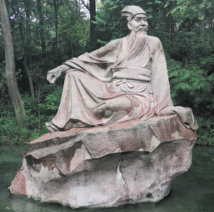A matter of good taste
Literary master appreciated good food and also fought against injustice, Huang Zhiling in Chengdu reports.

Beijing food connoisseurs who appreciate the Sichuan school of cuisine frequent restaurants named Meizhou Dongpo to devour classics, like Dongpo meat and dandan noodles.
These dishes satisfy both the taste buds and cultural curiosity, some argue.
Meizhou is today's Meishan city in Southwest China's Sichuan province where the literary genius Su Shi (1037-1101), also known as Su Dongpo, after whom the dish was named, was born in the Song Dynasty (960-1279).
The former home of his father Su Xun (1009-1066) and younger brother Su Zhe (1039-1112) is in the Ancestral Temple of the Three Sus in the center of Meishan. The Three Sus are among eight of China's most illustrious literary masters, who lived during the Tang (618-907) and Song dynasties.
The temple was built during the Song Dynasty. During a reconstruction project in 2019, more than 500 repairable cultural relics were excavated. It was found that the excavation site consisted of objects from the same era as the Three Sus.
Some of the relics are on display in the temple, according to Yang Zhengnan, a photographer who has been taking pictures at the museum for 25 years.
The temple which has been transformed into a memorial site and garden-like museum draws visitors fascinated by the life experience, literary achievements, moral precepts and family traditions of the three masters.
Museum visitors view the paintings and statues depicting how Su Shi's mother taught him and his younger brother the importance of clean living and of serving the people, says museum curator Chen Zhongwen.
The three literary masters left behind a large collection of writings and poems about moral precepts. Their own guiding principles led them to eventually leave their hometown to serve their countrymen. Su Shi refused to fret over possible misfortune and insisted on assisting the people as an official.
But to ordinary people, they know Su Shi best because the poet-gourmet created dishes which are still popular such as the Dongpo meat, Dongpo fish, Dongpo pork knuckle and Dongpo bean curd. Each of his dishes has a story to tell.
Su is known for cooking with local, ordinary and cheap ingredients and basic methods to create dishes which are household names in China.
In 1080, Emperor Shenzong of the Song Dynasty exiled Su Shi to Huanggang in Central China's Hubei province. Dainty morsels were scarce and the poet ventured to create his own.
Mutton and beef were treasured and their prices reflected this. Pork was belittled by the snobbish well-off and its price was as "low as mud", Su Shi wrote.
As an alternative, the poet cut pork into small cubes, stewing and simmering them in water and wine for two hours and heralding the birth of the red-braised pork known as the "Dongpo meat".
To commemorate his creation, Su Shi wrote the poem Ode to Pork with the lines "Heated by a slow fire, simmering in shallow water, its best qualities emerge when cooked for the perfect amount of time."
Nine years later, Su Shi worked as an official in Hangzhou in East China's Zhejiang province where he treated friends with his red-braised pork. As the dish's popularity grew, it was named after the poet and was called Dongpo meat. It has been a classic of Chinese cuisine ever since.
Su Shi attaches great importance to the relationship between diet and health preservation.
Although he liked cooking and jokingly referred to himself as a glutton, he never over indulged. If there were distinguished guests, there were no more than three dishes, he wrote.
When he worked in Hangzhou, people grateful to him for his good deeds for commoners, as well as colleagues and friends admiring his talent, would invite him to banquets.
Indeed, he became so disenchanted with banquets that Su Shi called Hangzhou the "wine and food hell".
Su Shi also targeted what he saw as injustices.
In his poem Song of Using the Stick with a Hook to Paddle Water to Catch Fish written in 1072, he satirized the fact that there were too many criminal penalties, which made people feel like fish stirred in water.
In one of his five famous four-line politically satirical poems about mountain villages which almost cost his life in 1079, he wrote that people in the mountain were hungry and poor, and that a 70-year-old man did not have salt for three months, which mocked the severe salt law.
Yin Bo contributed to the story.



Today's Top News
- Trump threatens 10% tariffs on 8 NATO allies
- PLA monitors US naval vessels transiting the Taiwan Strait
- The high cost of US cutting vaccine funding
- Visit highlights China's importance
- China fortifies energy security as risks rise
- Taiwan separatists warned of action






























